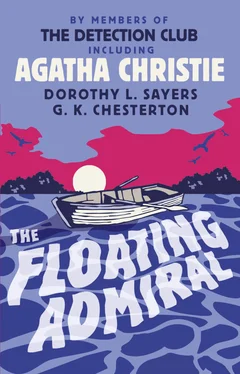And yet the next scene revealed, in a rift of that visionary vapour, is not any such scene of doom or punishment as some sensationalists might legitimately expect. It will not be necessary to gratify the refined modern taste with scenes of torture; nor to avoid the vulgarity of a happy ending by killing the principal character in the first chapter. Nevertheless, the scene revealed was perhaps, in its ultimate effects, almost more tragic than a scene of death. The most tragic thing about it was that it was rather comic. The gleam of the tawdry lanterns in the dope-den revealed nothing but a huddle of drugged coolies, with faces like yellow stone, the sailors from a ship that had put into Hong Kong that morning, flying the Stars and Stripes; and the final feature of a tall English naval officer, wearing the uniform of the Captain of a British ship, behaving in a peculiar way and apparently under rather peculiar influences. It was believed by some that what he was performing was a horn-pipe, but that it was mingled with motions designed only to preserve equilibrium.
The crew looking on was American; that is to say, some of them were Swedish, several Polish, several more Slavs of nameless nationality, and a large number of brown Lascars from the ends of the earth. But they all saw something that they very much wanted to see and had never seen before. They saw an English gentleman unbend. He unbent with luxuriant slowness and then suddenly bent double again and slid to the floor with a bang. He was understood to say:
“Dam’ bad whisky but dam’ good. WhadImeansay is,” he explained with laborious logic, “whisky dam’ bad, but dam’ bad whisky dam’ good thing.”
“He’s had more than whisky,” said one of the Swedish sailors in Swedish American.
“He’s had everything there is to have, I should think,” replied a Pole with a refined accent.
And then a little swarthy Jew, who was born in Budapest but had lived in Whitechapel, struck up in piping tones a song he had heard there: “Every nice girl loves a sailor.” And in his song there was a sneer that was some day to be seen on the face of Trotsky, and to change the world.
The dawn gives us the third glimpse of the harbour of Hong Kong, where the battleship flying the Stars and Stripes lay with the other battleship flying the Union Jack; and on the latter ship there was turmoil and blank dismay. The First and Second Officers looked at each other with growing alertness and alarm, and one of them looked at a watch.
“Can you suggest anything, Mr. Lutterell?” said one of them, with a sharp voice but a very vague eye.
“I think we shall have to send somebody ashore to find out,” replied Mr. Lutterell.
At this point a third officer appeared hauling forward a heavy and reluctant seaman; who was supposed to have some information to give, but seemed to have some difficulty in giving it.
“Well, you see, sir, he’s been found,” he said at last. “The Captain’s been found.”
Something in his tone moved the First Officer to sudden horror.
“What do you mean by found?” he cried. “You talk as if he was dead!”
“Well, I don’t think he’s dead,” said the sailor with irritating slowness. “But he looked dead-like.”
“I’m afraid, sir,” said the Second Officer in a low voice, “that they’re just bringing him in. I hope they’ll be quick and keep it as quiet as they can.”
Under these circumstances did the First Officer look up and behold his respected Captain returning to his beloved ship. He was being carried like a sack by two dirty-looking coolies, and the officers hastily closed round him and carried him to his cabin. Then Mr. Lutterell turned sharply and sent for the ship’s doctor.
“Hold these men for the moment,” he said, pointing to the coolies; “we’ve got to know about this. Now then, Doctor, what’s the matter with him?”
The doctor was a hard-headed, hatchet-faced man, having the not very popular character of a candid friend; and on this occasion he was very candid indeed.
“I can see and smell for myself,” he said, “before I begin the examination. He’s had opium and whisky as well as Heaven knows what else. I should say he’s a bag of poisons.”
“Any wounds at all?” asked the frowning Lutterell.
“I should say he’s knocked himself out,” said the candid doctor. “Most likely knocked himself out of the Service.”
“You have no right to say that,” said the First Officer severely. “That is for the authorities.”
“Yes,” said the other doggedly. “Authorities of a Court Martial, I should say. No; there are no wounds.”
Thus do the first three stages of the story reach their conclusion; and it must be admitted with regret that so far there is no moral to the story.
By Canon Victor L. Whitechurch
CORPSE AHOY!
EVERYONE in Lingham knew old Neddy Ware, though he was not a native of the village, having only resided there for the last ten years; which, in the eyes of the older inhabitants who had spent the whole of their lives in that quiet spot, constituted him still a “stranger.”
Not that they really knew very much about him, for the old man was of a retiring disposition and had few cronies. What they did know was that he was a retired petty officer of the Royal Navy, subsisting on his pension, that he was whole-heartedly devoted to the Waltonian craft, spending most of his time fishing in the River Whyn, and that, though he was of a peaceful disposition generally, he had a vocabulary of awful and blood-curdling swearwords if anyone upset him by interfering with his sport.
If you, being a fellow-fisherman, took up your position on the bank of the River Whyn in a spot which Neddy Ware considered to be too near his, he would let drive at you with alarming emphasis; if boys—his pet aversion—annoyed him in any way by chattering around him, his language became totally unfit for juvenile ears. Once young Harry Ayres, the village champion where fisticuffs were concerned, had the temerity to throw a stone at the old man’s float; he slunk back home afterwards, white in face and utterly cowed with the torrent of Neddy Ware’s lurid remarks.
He lived in a small cottage standing quite by itself on the outskirts of the village, and he lived there alone. Mrs. Lambert, a widow, went to his cottage for a couple of hours every morning to tidy up and cook his midday meal. For the rest, Neddy Ware managed quite well.
He came out of his cottage one August morning as the church clock, some half a mile distant, was striking four. Those who knew his habits would have seen nothing unusual in his rising so early. The fisherman knows the value of those first morning hours; besides which, the little River Whyn, which was the scene of his favourite occupation, was tidal for some five or six miles from the sea. For those five or six miles it meandered, first through a low valley, flanked by the open downs on one side and by wooded heights on the other, and then made its way, for the last four miles, through a flat, low-lying country till it finally entered the Channel at Whynmouth. Everyone knows Whynmouth as a favourite South Coast holiday resort, possessing a small harbour at the mouth of its river.
Twice a day the tide flowed up the Whyn, more or less rapidly according to whether it was “spring” or “neap.” And this fact had an important bearing on the times which were favourable for angling. On this particular morning Neddy Ware had planned to be on the river bank a little while after the incoming tide had begun to flow up the stream.
Behold him, then, as he came out of his cottage, half-way up the wooded slopes of “Lingham Hangar,” crossed the high road, and made his way down to the level of the river. He was fairly on in years, but carried those years well, so much so that there was only just a sprinkling of grey in his coal-black hair. A sturdy-looking man, cleanshaven, but with a curious, old-fashioned twist of hair allowed to grow long on either side of his head just in front of his ears; brown, weatherbeaten, lined face, humorous mouth and keen, grey eyes. Dressed in an old navy blue serge suit, and wearing—as he invariably did—a black bowler hat. Carrying rods, landing net, and a capacious basket containing all kinds of the impedimenta of his craft.
Читать дальше












